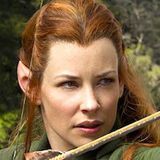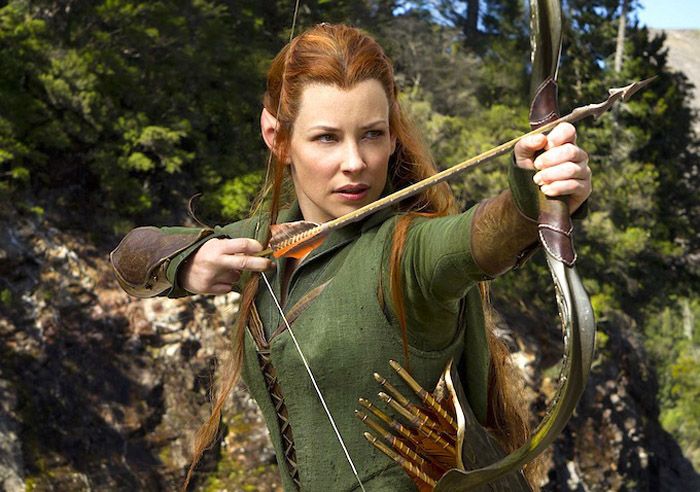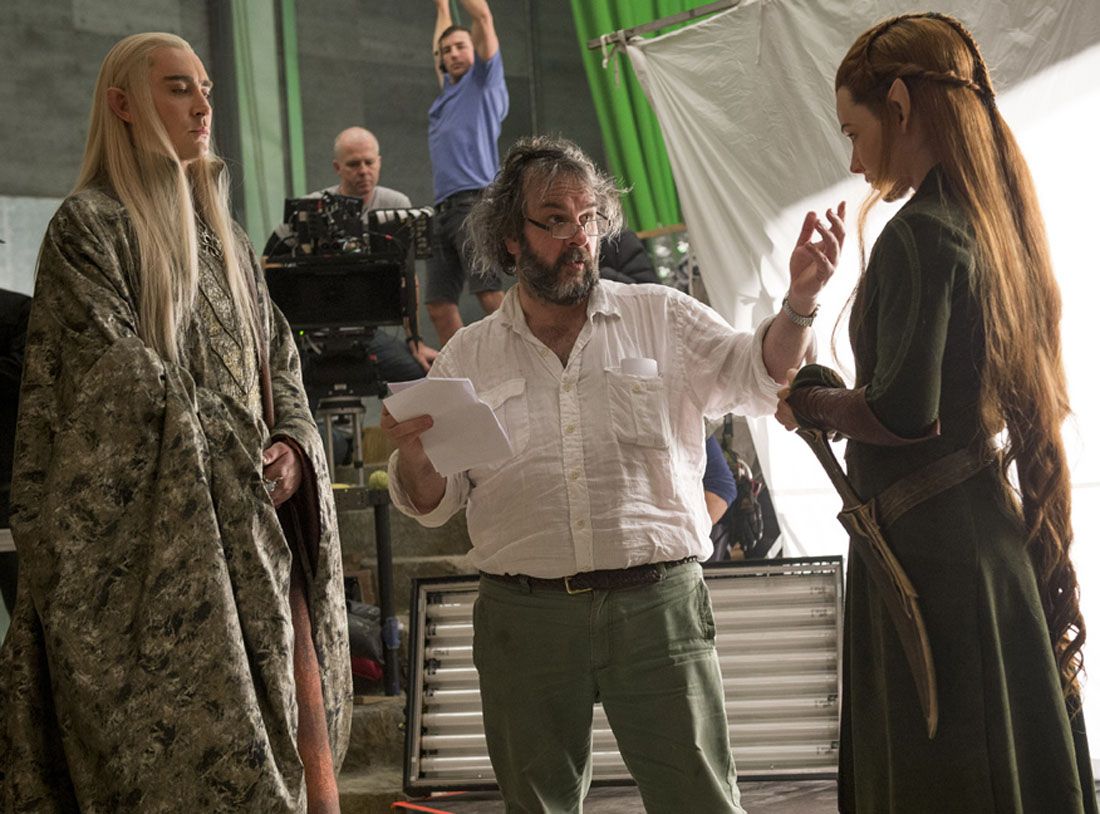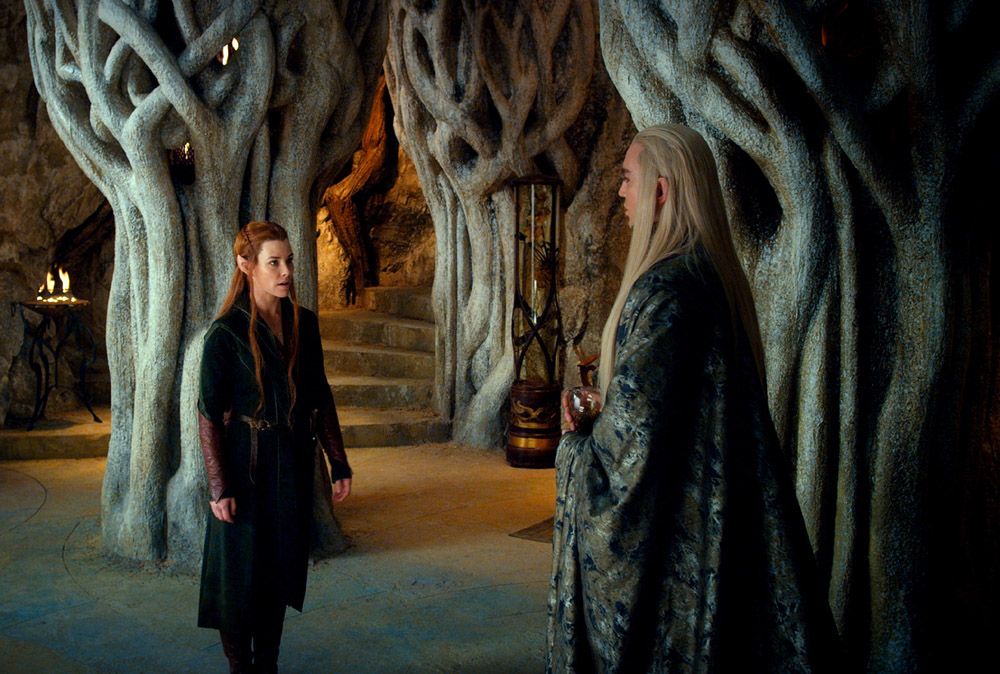Audiences haven’t seen much of Evangeline Lilly since Lost ended in 2010, but that doesn’t mean she’s not been busy: Beyond small roles in Real Steel and The Hurt Locker, she had a child, and was cast in a pivotal role in The Hobbit trilogy, which perhaps needless to say demanded a considerable amount of time and effort long before its theatrical premiere. But with The Desolation of Smaug, Lilly is back in the public consciousness, playing a character created especially for the movies yet fits in perfectly with her Elven brethren thanks to a terrific performance.
Lilly spoke to reporters at the Los Angeles press day for The Hobbit: The Desolation of Smaug, where she joined director Peter Jackson and writer-producer Philippa Boyens for a lively discussion about the conception of her character. In addition to talking about the motivations for creating Tauriel, the actress discussed the training she underwent for the role, and reflected on the choices she’s made in recent years as her career continues to grow.
Evangeline, your character was a warrior. Did you do anything like learn to shoot bows and arrows to train? And what did you think when you saw yourself on the screen for the first time with this fiery red hair and pointy ears?
Evangeline Lilly: I went through five different types of training: I did weapons training, stunt training, movement training, dialect training, language training. And in the weapons training, there were two different weapons -- I had double daggers and a bow and arrow. Believe it or not, I used to teach archery to little kids. Peter didn’t know that. At a kids’ camp, when I was a teenager, I used to teach archery. But I’m not a good marksman.
REVIEW: The Hobbit: The Desolation of Smaug Delivers With Action and Elves
Peter Jackson: Don’t say that. Just stop at the first part (laughs). Just say you taught it and it’ll be fine.
Lilly: Yeah, OK. And I think one of the great gifts of CGI and working in the imagination is that you can imagine that you’re much more talented than you really are. And if you can imagine it, it can appear as so with Peter Jackson’s magic CGI brush. And seeing myself for the first time on screen as an elf, it was a double-edged sword because I’m a real Tolkien geek, and I had dreamed about being an elf since I was a little girl. So there was an incredible amount of satisfaction and dream realization when I first got to see myself as an elf, but I’m also, unfortunately, an actor, which means that I’m very self-critical. It’s very hard for me to ever give anything I do a stamp of approval without having the appendices that says all the things I did wrong, and what didn’t work. Just the ears and the wig and the actual visual was very, very exciting.
Evangeline, I read that you were ready to retire, you'd just had a baby, when this came and changed your life. Can you talk about that? It seems like such a crazy idea. And also about the character of Tauriel, how you see her exactly, having this longing for a Dwarf?
Lilly: Retirement, right. What's so strange about retiring at 30? I think that's most people's dream. I was. I had retired into what I thought would be a life of quiet motherhood and writing, and didn't really plan on taking any more acting gigs. It's been about at least five years since I had taken a meeting or engaged in a new project. I was sort of off the grid, so to speak. I was so far off the grid that when Pete and Phil were trying to find me to get ahold of me about this role, they couldn't reach me. And somebody on their production team just coincidentally used to work with my partner, so he got a text message one day saying, "Peter Jackson's trying to reach Evangeline. Do you think she might be able to pick up the phone, please?
And so they did eventually get ahold of me, and of course because The Hobbit was my favorite book as a little girl and the Silvan Elves were my favorite characters in the book, and it would be a dream come true to play one, I jumped at the opportunity. I picked up the phone very quickly. And then they said, "Your character's not in the book." And I took great pause, as a great fan of Tolkien. I kind of gulped and went, "What? Everyone's going to hate me." It didn't take long for them to completely convince me that it was the right thing to do and it was a good idea.
RELATED: The Hobbit's Peter Jackson on Dwarves in Barrels, Action and The Desolation of Smaug
Philippa Boyens: I remember that phone call, and I remember that moment where I said, "The love story, it's not a conventional love story." And you were like, "Right, OK …" "With a Dwarf." And there was silence, and then I went, "But hang on, I'm going to send you his photo! It's Aidan Turner, so it's OK!" I did, and then you went, "OK, yeah yeah …"
Lilly: She did. She goes, "He is soooo handsome. Just wait and see." But also at that moment when she said there's a love story — Phil might not remember this, but I agreed to the job under one condition. One condition, and they agreed to the condition, and that condition was in place for two years. The condition was I will not be involved in a love triangle. Right? Because any of you who are fans of Lost, I've had it up to here with love triangles. And sure enough, I come back for reshoots in 2012 and they go, "We've made a few adjustments to the love story."
Boyens: Well, it was a "whoops" moment. That was genuine, there really wasn't a triangle, there wasn't. But what happened was when we saw it playing and just that first look between Kili and Legolas, that kind of exchange of looks, was so perfect that we were like … And also interesting with Legolas, because one of the things we were trying to do was he hates Dwarves in The Fellowship of the Ring. There's this animosity, this whole kind of … that had to have come from somewhere. What was it about? And we wanted to make it a little bit more emotional than just, "I don't like them."
Lilly: And that played well.
Boyens: And then also when you came back, I said to her, “Oh, no, God,” I said, “Hang on. Orlando Bloom, Aidan Turner – you’re caught between the two of them. I’m sorry, what’s the problem?”
Is convincing your actors that their plot lines are OK something that you have to do often, Philippa?
Boyens: With Tauriel, and because Evangeline is not joking, she’s a huge Tolkien fan, you were concerned, and we understood that, but we did explain where some of that came from – the relationship between Gimli and Galadriel that was kind of very pure, that sort of interesting love. And also, that femininity that was lacking, because Professor Tolkien actually wrote fantastic female characters, he just didn’t write one for The Hobbit. And you understood that immediately – and you were brave, and you said yes, which we were [happy about – inaudible].
Lilly: And in his defense, Tolkien was writing in 1937. The world is a different place today, and I keep repeatedly telling people that in this day and age, to put nine hours of cinema entertainment in theaters for young girls to go and watch, and not have one female character for them to watch is subliminally telling them, “you don’t count.” You’re not important, and you’re not pivotal to story. And I just think they were very brave and very bright in saying, “We won’t do that to the young female audience who come and watch our film.” And not just the young female audience, but even a woman of my own age, I think it’s time we stop making stories that are only about men – especially only about heroic men. And I love that they made Tauriel a hero.
As a huge Tolkien fan, have you found that his work inspires your writing that you’ve been working on and has your experience working on books informed your acting in any significant way, particularly in this role?
Lilly: I think Tolkien definitely inspires me as a writer, and inspired me towards writing because good story impacts your life. I think somewhere deep down inside, one of the great motivations to write is to have an impact, to say something. And then recently I’ve been doing a lot more studying writing. Much like acting, I’m not formally trained, I’m not formally trained in writing and I think writing is a little bit more of a structured-specific craft. I’ve been doing my homework. I’ve been studying. As I’ve been studying and learning about story structure learning more about what it takes to develop a story that will have an impact, that will resonate with an audience, the more it starts to impact my choices as an actress. I find myself right now, when I look at different roles and potential things for the future, where before I would read a script and instinctively I knew if I wanted to do the job. If that story was resonating and it might feel impactful or say something to the world. Now I am able to make a more cerebral choice. In my mind I can actually break it down and say what’s missing is X, Y and Z. If only they had added these six elements then the script would have come to a place where I would be willing to do it. I think something we all know by gut instinct because we’ve been telling stories since the beginning of time. We all instinctively know what works and what doesn’t, I’m starting to now intellectually understand that.
The Hobbit: The Desolation of Smaug arrives today in theaters.




